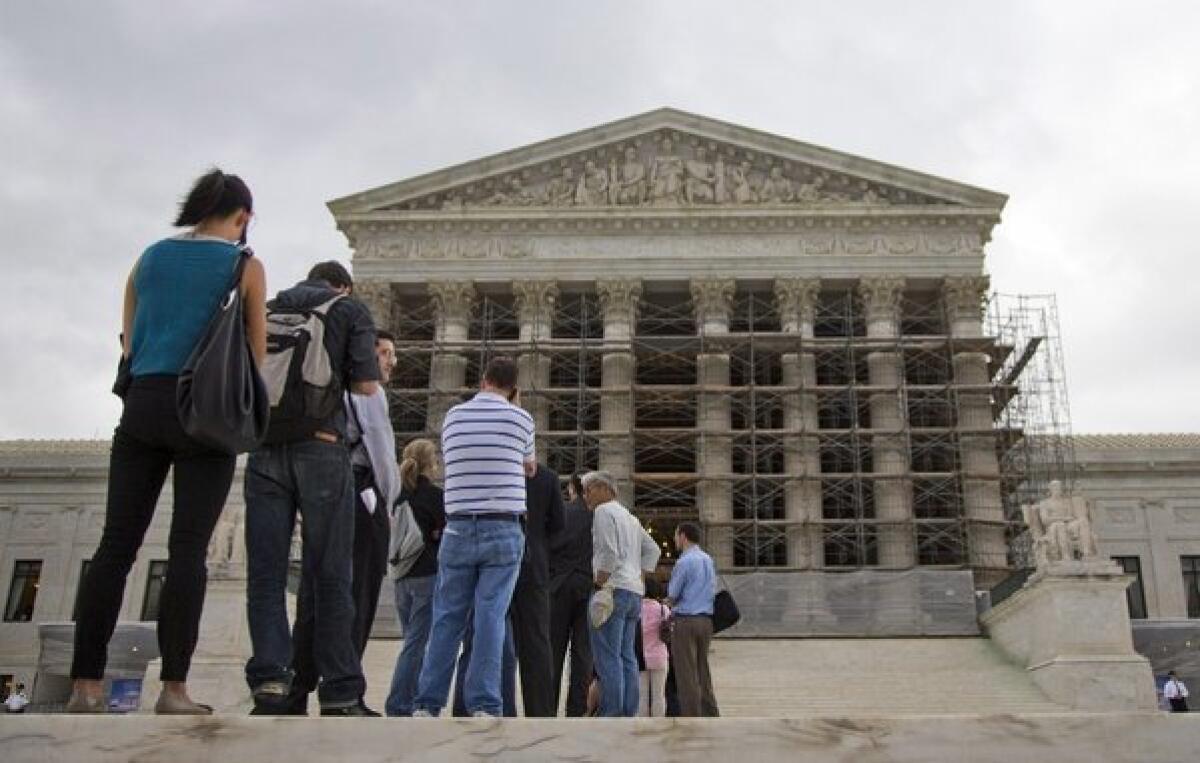Supreme Court to hear case on separating church and state

- Share via
WASHINGTON — When Susan Galloway, who is Jewish, and Linda Stephens, an atheist, complained about the Christian prayers at town board meetings in Greece, N.Y., they were told they could “leave the room or just not listen,” Galloway said.
“We felt like outcasts,” Galloway said. “We are not Christians, but we wanted to be at the meetings. When the minister was at the podium, it felt like a pulpit.”
On Wednesday the U.S. Supreme Court will hear an appeal of a lower court decision in their favor in a case that could lead to a significant shift in law separating church and state and free city councils to open their meetings with explicitly Christian prayers.
In the past, the court has upheld traditional opening invocations that call for God’s blessing. “To invoke divine guidance on a public body entrusted with making laws is not an ‘establishment’ of religion,” Chief Justice Warren Burger said in a 1983 decision upholding the invocations before the Nebraska Legislature. The justices could hardly rule otherwise, since their public meetings begin with a marshal proclaiming: “God save the United States and this honorable court.”
But it has been much disputed across the country whether town councils or county boards can regularly invite Christian ministers to open their public meetings with prayers to Jesus Christ.
In Greece, a suburb of Rochester, the board for more than seven years had begun its monthly meetings with a prayer led by one of the town’s Christian pastors. Sometimes, the dozen or so attendees were asked to stand and bow their heads.
Galloway and Stephens filed a lawsuit backed by Americans United for Separation of Church and State. Last year, they won a ruling from the U.S. court of appeals based in Manhattan. The New York-based judges said a town crosses the line when the large majority of its government-sponsored prayers favors one religion. “We conclude, on the record before us, that the town’s prayer practice must be viewed as an endorsement of a particular religious viewpoint,” wrote Judge Guido Calabresi.
But when the Supreme Court agreed to hear the case of Town of Greece vs. Galloway, several conservative groups urged the justices to make a far-reaching change in the law. They said the court should pull back from the idea of church-state separation and throw out the “endorsement” test championed by now-retired Justice Sandra Day O’Connor. She had said the government must be neutral toward religion and that officials violate the Constitution if their actions would appear to a “reasonable observer” as if they were endorsing a religion.
Instead, the conservatives urged the court to rule that cities, counties and public schools may favor or promote religion, so long as no one is forced to participate in a religious exercise. This would clear away the legal challenges to religious symbols at government buildings, such as the Ten Commandments or a Nativity scene during the Christmas season. It could also permit prayers and invocations at public school events.
Notre Dame Law professor Gerard Bradley thinks justices may be ready to “reject or seriously modify the ‘endorsement’ test. There’s been a growing dissatisfaction with it on the court.”
Since Justice Samuel A. Alito Jr. replaced O’Connor in 2006, the court has had a majority of justices who support more accommodation for religion in public life, rather than strict separation. But they have yet to agree on a broad ruling that changes the law.
Lawyers for the town said the court should adopt a hands-off approach and free cities and counties from second-guessing by judges. Courts have no business acting as “theological censors, deciding whether particular prayers are too religious or too ‘sectarian,’” they said. The Obama administration’s lawyers largely agreed and filed a brief on the town’s side.
Advocates for church-state separation call this view alarming. They say this “anything-goes” approach would permit local officials — whether they are evangelical Christians in Alabama or devout Muslims in Dearborn, Mich. — to use local government meetings as a platform for delivering their own religious message.
University of Virginia Law professor Douglas Laycock, an expert on the Constitution’s religion clauses, will argue for Galloway. He says a town’s residents must sometimes must go to a board meeting because they need a permit or have other business. If the court rules for the town of Greece, government officials would be free to “press prayers on a captive audience,” he said, “even those that promise eternal hellfire to religious minorities.”
Another option for the justices is to insist on prayers that reflect the religious diversity of the town. Greece’s lawyers noted that after Galloway and Stephens complained, several non-Christians were invited to offer the opening prayers. “The opportunity is open to all residents,” they told the court, “and Christian, Jewish, Bahai and Wiccan adherents all delivered prayers.”
The Supreme Court will hear arguments in Greece vs. Galloway on Wednesday and issue a ruling by June.
More to Read
Sign up for Essential California
The most important California stories and recommendations in your inbox every morning.
You may occasionally receive promotional content from the Los Angeles Times.














